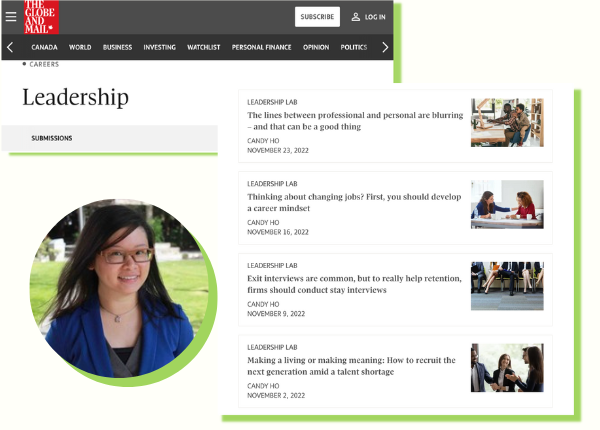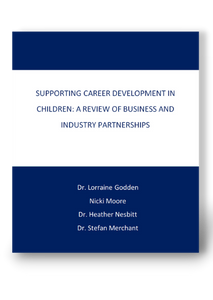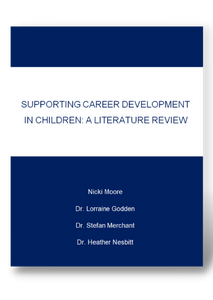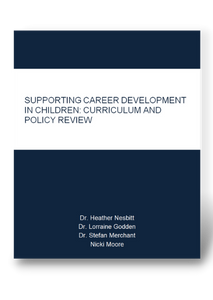
Career development the focus of The Globe’s Leadership Lab for November
November 23, 2022
Professors honoured by OCCOQ for their revision of CERIC’s Career Theories and Models for the francophone professional community
December 12, 2022The first phase of a CERIC-funded research project has now produced three literature reviews that examine what is happening in elementary education across Canada related to introducing and building career-related foundational skills. These newly available documents include: a review of scholarly literature; a curriculum and policy review; and a review of business and industry partnerships.
The project, Career Development in Children: Identifying Critical Success Conditions and Strategies, is being undertaken by an international team of academic researchers led by Dr. Lorraine Godden of Ironwood Consulting and Carleton University. The research seeks to understand how foundational concepts and skills that are introduced and developed by teachers in Grades 4 to 6 connect to career-related learning in Canadian classrooms.
The reviews have found that across Canada, provinces and territories have implemented a variety of educational strategies, initiatives, policies and programs to help young people achieve productive and fulfilling lives. Ministries, school boards and schools have a range of proactive frameworks and policies. However, several challenges impact their successful implementation. For example, many elementary schools have limited resources beyond the classroom teacher to support students’ career and life planning, and many teachers are not aware they are developing critical career skills in their students.
Supporting Career Development in Children: A Literature Review
This document contains a review of literature which investigates the practices to support the development of career-related foundational skills in children aged 9-11 in Canadian elementary schools. The review explores the scholarly literature related to career development terminology, career development frameworks and theoretical understandings, and empirical work that examines the ways teachers introduce and develop foundational career skills (e.g., healthy habits of mind and being, social and emotional skills, self-confidence, self-efficacy). This literature review recognizes that career vocabulary and terminology are the building blocks on which all career interventions are built.
The literature review includes:
- An extensive exploration of career-related terminology that educators might encounter in the career-related work in schools;
- An exploration of how work is linked to career development;
- A detailed overview of typical expected outcomes of career development;
- An overview of empirical career-related learning and career development theoretical frameworks;
- An outline of typical career-related learning outcomes seen in Canada, Australia, New Zealand and the United Kingdom;
- An examination of what career-related learning looks like in elementary schools; and
- A summary of contemporary issues related to career.
Supporting Career Development in Children: Curriculum and Policy Review
This curriculum and policy review examines provincial and territorial policy, reporting and curriculum documents for career-related learning, including relevant social studies, health and wellness, and social and emotional learning documents. This pan-Canadian exploration provides insight into what is happening in career education in Grades 4, 5 and 6, showing differences across the country. This review has involved developing a greater understanding of the role that geographic context plays in influencing practice related to delivering career-related learning.
Findings include:
- Some provinces and territories, such as Ontario, British Columbia and Yukon, have embraced a Kindergarten to Grade 12 approach to career education.
- In other areas of the country, career education begins to emerge in Grades 5 and 6 (e.g., Alberta, Saskatchewan and the Atlantic provinces).
- Still other regions do not appear to have any formal career education currently in place at the elementary level (e.g., Nunavut).
Supporting Career Development in Children: A Review of Business and Industry Partnerships

The review answers:
- Which provinces and territories have business and industry partnerships?
- What partnerships and programs currently exist between business and industry and elementary schools?
- Which provinces and territories have Industry Education Councils?
- What connections do Industry Education Councils have with elementary schools?
These three literature reviews are intended for and can benefit:
- Teachers – in elementary and secondary schools who are supporting their students with career-related learning;
- Guidance counsellors – who are delivering and managing career-related knowledge, information and services across their schools;
- School leaders and district school board administrators – who are determining the scope of career-related learning across their schools;
- Curriculum developers – who are looking for worthwhile practices to incorporate into career-related programming and development;
- Policymakers – who are directing courses of action across the policy life cycle, and are evaluating the role of different policy actors within career-related policy in schools;
- Government – who are making decisions as to what career-related learning should look like in schools; and
- Business and industry partners – who are making decisions to form or undertake strategies that support career-related learning in their local and broader community schools.
Research for this project is ongoing with data being collected from educators, parents and Grade 4-6 students in public school settings across Canada. This has involved ensuring the inclusion of diverse perspectives: Indigenous communities, immigrant communities, francophone communities, special needs educators, and urban, rural and remote communities.
The next phase of this project is focused on the development of a teacher’s toolkit, including strategies and interventions teachers can use to develop critical career-related foundational skills with students. On Monday, January 23 at Cannexus, Canada’s Career Development Conference, Dr. Godden and fellow researchers will be leading a virtual research circle entitled Teaching Careers to Grades 4-6? Pilot Our Toolkit! In this interactive community consultation, participants can review the evidence gathered to support toolkit development, sample different class-based activities and provide feedback to help shape the final toolkit.



